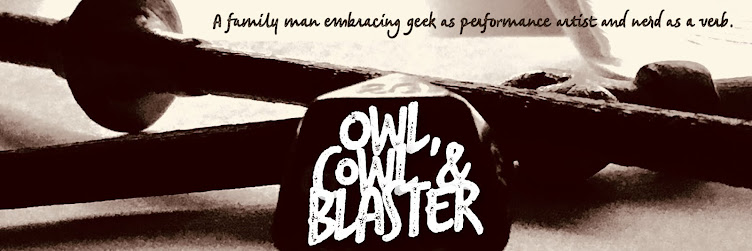I recall having heard--now several years ago--that an adaptation of the fan-favorite comedic space opera Galaxy Quest might be coming to broadcast television. When I subsequently learned that Seth MacFarlane was developing a Star Trek parody for Fox, I supposed it was the same project. Once I learned that the show was going to be called The Orville, I held out hope that the series was being set in the same fictional universe despite the titular starship not being named the NSEA Protector. It wasn't until a few weeks before the air date of the premiere in 2017--upon my reading of some vague plot summaries--that those hopes were definitively dashed. And while I did watch the premiere, I will admit that I did so with a Borg-cube-sized chip on my shoulder.
Even at that first watching, I was grudgingly impressed--though a bit confused by what the show was trying to be. It clearly wasn't Galaxy Quest--arguably not in the same league (or federation or union) as the 1999 cult classic starring Tim Allen, Sigourney Weaver, and Alan Rickman. That movie had been a very clever action comedy that satirized Star Trek while leveraging a smart premise, decent pacing and effects, and charming performances. The core idea was that aliens could see a science fiction show broadcast from Earth and not realize it was fiction. In the movie, this would result in a group of actors finding themselves thrust into a real galactic conflict with life and death consequences. And while the movie was self-contained with a satisfying conclusion, I could picture an accomplished creative team--perhaps the minds behind HBO's Barry--finding much more to explore and unpack about this premise in a longer serialized format like TV. (I'd see it being more of a reboot than a continuation--a slower developing story that could dig into the foibles of the actors and their hosts.)
Aside from also being a parody of Gene Roddenberry's Star Trek, The Orville doesn't really share any conceptual details with Galaxy Quest. Because whereas Galaxy Quest was largely satirizing and fictionalizing the cultural phenomenon of Star Trek--the relationships among the actors and between the actors and their fans, The Orville parodies the internal premises of the show--its democratic federation of planets plagued by the repeated hostile incursions of neighboring space empires. The former is well primed for comedy; the latter--in my mind, at least--not so much. A group of actors acting neurotically while struggling through a colossal case of mistaken identity doesn't require a lot of defense, and I feel that Allen in particular does a good job of selling it. It requires much more suspension of disbelief to picture an advanced society of scientists and explorers bumbling their way in and out of peril. Nevertheless, I think Seth MacFarlane and his cast-mates manage to pull it off more often than not.
WHAT THE ORVILLE ISN'T
The Orville is an unusual adventure narrative. I wouldn't call it a comedy and I wouldn't call it a drama. Even trying to categorize it as a "dramedy"--the term I'd use for shows like M.A.S.H. or Sports Night--is a tough fit since those shows toggled deftly between light and heavy notes, usually leaning into the latter in the waning moments of an episode. The Orville doesn't have that kind of pacing or wit, nor does it really appear to have such aspirations; the creative team seems unabashed about switching gears very quickly, before a joke or emotional note can really take hold, while also sometimes lingering on either drama or comedy for what can be uncomfortable lengths of time. (This makes some of the weaker episodes feel longer than an hour.)
And you can't really make any fair apples-to-apples comparisons between Seth MacFarlane's Captain Ed Mercer and Tim Allen's Jason Nesmith (i.e., TV's Commander Peter Quincy Taggart) or any of the Star Trek captains (Kirk, Picard, Janeway, etc.). While I absolutely love some of the more dramatic moments in Allen's performance in the last 20 minutes of Galaxy Quest--including perhaps one of my favorite space combat gambits inclusive of the Star Trek movies--it's just 20 minutes of film. MacFarlane is navigating the ups and downs of now dozens of hour-long episodes--too much humor for comparison to Star Trek and too much drama for comparison to Galaxy Quest.
WHAT THE ORVILLE IS
What The Orville is, most of all, is an eminently watchable, unvarnished love letter to Star Trek The Next Generation (TNG). Seth MacFarlane and I are about the same age, and I know that I likewise loved the show growing up--being too young to have seen the original Star Trek series save for in syndicated re-runs. This was "our" Star Trek. And that feeling is quite evident throughout The Orville.
MacFarlane's show is an extremely sincere homage from a creator known for snark rather than sincerity. The cold open at the beginning of most episodes feels like it could slip seamlessly into the rotation of any season of TNG. The montage shown under the opening credits, the music, the videography--they literally all feel like they came from a Paramount backlot garage sale. I just finished the Season 2 two-parter called "Identity" and it felt like it was a tribute to TNG's "The Best of Both Worlds." And I like how the sincerity extends to MacFarlane's performances as well as those of Adrianne Palicki, Penny Johnson Jerald and others.
MY (OVERALL) TAKE
I won't lie and tell you that every joke yields a smile or that every intense moment elicits the level of emotional investment that the creative team is targeting. But when The Orville is at its best, it makes me remember exactly what I loved about Star Trek and the crew of the Enterprise. And that is a favor I'll gladly return with continued viewing.





